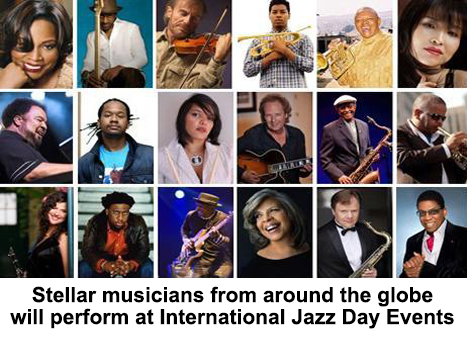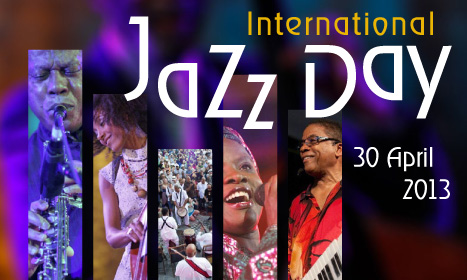There has been much hand-wringing among jazzers of all stripes—those on the bandstand and off—regarding the demise of jazz in the context of American popular culture. You certainly get that impression by the limited, narrow-focus emphasis by the National Academy of Recording Arts & Sciences (NARAS), the folks who bring you the Grammy awards every February. Based on this show alone you get the impression that the only music created and heard in America is pop, hip-hop, and rap. Other shows like “American Idol” and “The Voice” and a plethora of movie and television show music tracks only serve to reinforce that impression.
Fortunately, there’s more to the global music picture than what is presented, especially when it comes to jazz. Even a cursory look around the planet, particularly this month, and you get a strong sense of America’s indigenous music is in a resurgent mode.
For example:
- April is Jazz Appreciation Month (JAM). All over the country performers, educators and journalists are performing and talking about jazz, a four-letter word packed with American culture and history.
- Tomorrow (April 30) is the UNESCO-sponsored Second Annual International Jazz Day, taking place this year in Istanbul, Turkey. Yes, Istanbul, Turkey.
- On April 12, 2013, Jazz at Lincoln Center announced a joint venture with several Chinese-based firms to establish a jazz presence in Shanghai, China. Yes, Shanghai, China.
This last announcement will be described in next week’s blog.
According to a February 2013 release, UNESCO Director-General Irina Bokova, UNESCO Goodwill Ambassador Herbie Hancock, the Thelonious Monk Institute of Jazz, and the Republic of Turkey announced that the main event for the second annual International Jazz Day will be hosted by Turkey in the city of Istanbul. Held every year on April 30th, International Jazz Day brings together communities, schools and groups from across the world to celebrate jazz, learn about its roots and highlight its important role as a form of communication that transcends differences.
 Director-General, Irina Bokova, stated, “. . . A meeting place of global cultures, Istanbul is an ideal location to highlight the extensive influence of jazz. Official celebrations, concerts and educational programs will take place in Istanbul and around the globe, expanding on the tremendous success of last year’s inaugural International Jazz Day.”
Director-General, Irina Bokova, stated, “. . . A meeting place of global cultures, Istanbul is an ideal location to highlight the extensive influence of jazz. Official celebrations, concerts and educational programs will take place in Istanbul and around the globe, expanding on the tremendous success of last year’s inaugural International Jazz Day.”
Taken forward in partnership with the Thelonious Monk Institute of Jazz, International Jazz Day was adopted by UNESCO Member States on the initiative of UNESCO Goodwill Ambassador Herbie Hancock, in order to encourage and highlight jazz’s unique power for advancing intercultural dialogue and understanding across the world. International Jazz Day is recognized on the official calendars of UNESCO and the United Nations. Its programs and events will be coordinated with all 195 Member States of UNESCO. On International Jazz Day, jazz is celebrated, studied, and performed around the world for 24 hours straight.
Tom Carter, President of the Thelonious Monk Institute of Jazz, said, “Last year’s celebration reached more than one billion people through educational programs, performances and media coverage. This is a phenomenal figure that we believe will be surpassed in 2013.”
 Celebrations in Istanbul will kick off with a special early morning performance for high school students conducted by Herbie Hancock, Wayne Shorter and others. The evening concert at Istanbul’s famed Hagia Irene will feature performances by stellar musicians from around the world, including pianists John Beasley, George Duke, Robert Glasper, Herbie Hancock, Abdullah Ibrahim, Keiko Matsui and Eddie Palmieri; vocalists Al Jarreau, Milton Nascimento and Dianne Reeves; trumpeters Hugh Masekela, Imer Demirer and Christian Scott; bassists James Genus, Marcus Miller, and Ben Williams; drummers Terri Lyne Carrington and Vinnie Colaiuta; guitarists Bilal Karaman, John McLaughlin, Lee Ritenour and Joe Louis Walker; saxophonists Dale Barlow, Igor Butman, Jimmy Heath, Wayne Shorter and Liu Yuan; clarinetists Anat Cohen and Hüsnü Şenlendirici; violinist Jean-Luc Ponty; Pedro Martinez on percussion and other special guests.
Celebrations in Istanbul will kick off with a special early morning performance for high school students conducted by Herbie Hancock, Wayne Shorter and others. The evening concert at Istanbul’s famed Hagia Irene will feature performances by stellar musicians from around the world, including pianists John Beasley, George Duke, Robert Glasper, Herbie Hancock, Abdullah Ibrahim, Keiko Matsui and Eddie Palmieri; vocalists Al Jarreau, Milton Nascimento and Dianne Reeves; trumpeters Hugh Masekela, Imer Demirer and Christian Scott; bassists James Genus, Marcus Miller, and Ben Williams; drummers Terri Lyne Carrington and Vinnie Colaiuta; guitarists Bilal Karaman, John McLaughlin, Lee Ritenour and Joe Louis Walker; saxophonists Dale Barlow, Igor Butman, Jimmy Heath, Wayne Shorter and Liu Yuan; clarinetists Anat Cohen and Hüsnü Şenlendirici; violinist Jean-Luc Ponty; Pedro Martinez on percussion and other special guests.
The concert will be streamed live on the internet on JazzDay.com, MonkInstitute.org, UNESCO and U.S. State Department websites.
To date, nearly 80 events have been organized in more than 30 countries, including Argentina, Australia, the Republic of Korea, France, Gabon, Malaysia and Trinidad and Tobago. In Armenia, the Municipality of Yerevan is organizing an open-air concert and will introduce jazz history and jazz performance in several schools around Yerevan. In Mexico, more than ten jazz concerts are scheduled throughout the country. Denmark will host “Jazz as a Verb” in Copenhagen, a day seminar and evening concert for both Danish and international musicians. In India, Jazz Goa in will celebrate the day with a mega event featuring jazz artists from all over the world. In Swaziland, a special program “Jazz across Borders and Cultures” will include workshops, jam sessions, and concerts over three days.
There is a large message in all of this. Despite the “apparent” marginalization of jazz in American mainstream media, and the lack of “broadcast” visibility of various jazz genres at the Grammys, jazz is a global happening and has been for almost a century. There is much evidence to show that within a few years of jazz’s emergence from New Orleans in the early part of the 20th century, with the technological support of steamships, sheet music, and the gramophone, jazz spread throughout the world—to Europe in one direction and China in the other, and many geographical points in between. In a sense, the establishment of International Jazz Day is late coming to the party. Jazz has been a cultural happening on an international scale for almost five score. Better late than never.
Please write to me at meiienterprises@aol.com if you have any comments on this or any other of my blogs.
Eugene Marlow, Ph.D.
April 29 2013
© Eugene Marlow 2013


